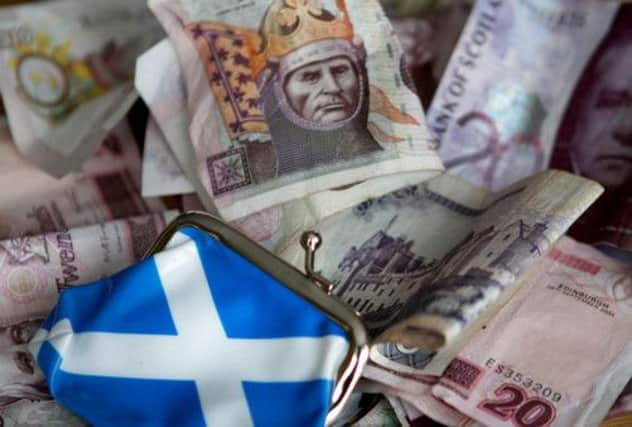Scottish independence: ‘Own currency needed’ claim


An independent Scotland’s economy could be dominated by England if it continued to use the pound, or by Germany if it joined the euro after a Yes vote, the experts said.
The stark warning was made in a report by Jim and Margaret Cuthbert, whose work on the Scottish economy has been regularly cited by SNP figures.
Advertisement
Hide AdAdvertisement
Hide AdSpeaking at the launch of the paper alongside former SNP leader Gordon Wilson in Edinburgh, Mr Cuthbert said Greece’s problems in the eurozone were evidence of the “inherent restrictions” the SNP’s plan to keep the pound as part of a monetary union would place on Scotland.
But the transition to a separate currency would be “difficult” and “depends hugely on future unknowable events”.
The report was commissioned by the Jimmy Reid Foundation think tank and the Options for Scotland nationalist group.
It dismissed claims Scotland was too small to have a stable independent currency, pointing to examples such as Norway, Denmark and Switzerland, and said fiscal control would be ceded to England if it used the pound, or Germany if it joined the euro.
SNP ministers have insisted an independent Scotland would be able to keep the pound as part of a currency union with the rest of the UK. But anti-independence parties say the SNP’s plans would leave Scotland with no influence over the country’s monetary policy, with interest rates set by the Bank of England.
The paper comes as the SNP government prepares to publish its independence white paper this autumn.
The report said that, under independence, Scottish ministers would face a stark choice over whether to adopt a Scottish currency or lose control of monetary policy by keeping the pound or joining the euro.
“The basic choice … would be whether it wanted to control its own monetary policy, in which case it would need to have its own currency, or whether to opt for some arrangement like membership of a currency union, or operating a currency peg, both of which would involve ceding control over monetary policy,” the report said.
Advertisement
Hide AdAdvertisement
Hide AdHowever, Mr Cuthbert, a former Treasury and Scottish Office adviser, highlighted debt-ridden Greece as an example of a country that suffered due to its membership of a monetary union – the eurozone.
He said: “It’s very difficult to have independence within a currency union. Greece says it all. In any currency union, there are restrictions on individual members and that doesn’t equate to independence.”
The Cuthberts said in their paper it was “a given” that Scotland could be a viable independent country. However, they asked: “Without its own currency, can Scotland escape from the drawbacks of having a monetary policy delivered primarily in the interests of the south-east of England, or indeed of Germany if Scotland chose to join the euro?
“On the other hand, it is sometimes objected that an economy of Scotland’s size, with its own currency, would have an inherently unstable exchange rate. This is not necessarily so: in fact, countries like Norway, Denmark and Switzerland have managed their currencies historically in a more stable fashion than the UK.”
Labour’s constitutional spokesman Drew Smith said the Cuthberts’ findings “discredit the SNP’s plans” and that there was now a “stack of evidence” against First Minister Alex Salmond’s stance on the issue.
Mr Smith said: “With just over a year to go, we still have no detailed currency plan for an independent Scotland. Alex Salmond wants to keep the pound but would relinquish any control to what would be a foreign government under separation.”
The SNP dismissed the Cuthberts’ claims and insisted retaining the pound under independence would be in the best interests of Scotland and the rest of the UK.
An SNP spokesman said: “In terms of monetary policy, we are clear that a shared sterling area is in the best interests of an independent Scotland and the rest of the UK – as recommended by the Scottish Government’s expert fiscal commission.”